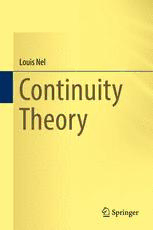Table Of ContentLouis Nel
Continuity
Theory
Continuity Theory
Louis Nel
Continuity Theory
123
LouisNel
SchoolofMathematicsandStatistics
CarletonUniversity
Ottawa,ON,Canada
ISBN978-3-319-31158-6 ISBN978-3-319-31159-3 (eBook)
DOI10.1007/978-3-319-31159-3
LibraryofCongressControlNumber:2016936373
Mathematics Subject Classification: Primary: 46-01 Secondary: 46A19, 46B10, 46K99, 46M99,
54-01,54A05,54B30,18-01
©SpringerInternationalPublishingSwitzerland2016
Thisworkissubjecttocopyright.AllrightsarereservedbythePublisher,whetherthewholeorpartof
thematerialisconcerned,specificallytherightsoftranslation,reprinting,reuseofillustrations,recitation,
broadcasting,reproductiononmicrofilmsorinanyotherphysicalway,andtransmissionorinformation
storageandretrieval,electronicadaptation,computersoftware,orbysimilarordissimilarmethodology
nowknownorhereafterdeveloped.
Theuseofgeneraldescriptivenames,registerednames,trademarks,servicemarks,etc.inthispublication
doesnotimply,evenintheabsenceofaspecificstatement,thatsuchnamesareexemptfromtherelevant
protectivelawsandregulationsandthereforefreeforgeneraluse.
Thepublisher,theauthorsandtheeditorsaresafetoassumethattheadviceandinformationinthisbook
arebelievedtobetrueandaccurateatthedateofpublication.Neitherthepublishernortheauthorsor
theeditorsgiveawarranty,expressorimplied,withrespecttothematerialcontainedhereinorforany
errorsoromissionsthatmayhavebeenmade.
Printedonacid-freepaper
ThisSpringerimprintispublishedbySpringerNature
TheregisteredcompanyisSpringerInternationalPublishingAGSwitzerland
toLaura
Preface
Continuitytheoryhaslongbeenstudiedinthesettingoftopologicalspaces.In1966
anenrichmentofthissettingwasdiscovered:onethathaspowerspaces.Researchers
workinginthisexpandedsettinghaveproducedremarkableresults,notobtainable
in the old setting. Untilnowtheir impressivework hasappearedonlyin research-
orientedpublications.Studentsgenerallyremainunawarethatitevenexists.
Thisbookmakesthisevolvingenrichedcontinuitytheoryaccessibletostudents
as soon as they are ready to advance beyond metric spaces. Topological theory
is fully embedded in the enriched version. So this book can be a substitute for
introductory books on classical general topology. It also provides a foundation
for enriched functional analysis, into which classical functional analysis is fully
embedded.
The overviewof Chap.1 elaboratesonthe aboveremarks.Itoutlineswhatlies
aheadandindicateshowcontinuitytheorybecomesstrengthenedbytheenrichment.
I am grateful to Carleton University for a congenial work environment over
severaldecadesandto theNationalScience andEngineeringResearchCouncilof
Canadafortheresearchfunding.
[email protected] LouisNel
January2016
vii
Contents
1 Overview..................................................................... 1
1.1 WaystoExpressContinuity ......................................... 1
1.2 CategoricalConcepts................................................. 4
1.3 EnrichedFunctionalAnalysis ....................................... 11
2 GeneralPreparation ....................................................... 17
2.1 AboutSets............................................................ 17
2.1.1 AxiomsforSets............................................. 18
2.1.2 SetBuilding................................................. 19
2.2 Functions ............................................................. 20
2.2.1 AnatomyofFunctions...................................... 20
2.2.2 FunctionRelatedConcepts................................. 21
2.3 IndexedSetBuilding................................................. 24
2.3.1 ConstructionswithIndexedFamiliesofSets.............. 24
2.3.2 ImagesandPreimagesofFamilies......................... 26
2.4 Relations.............................................................. 27
2.4.1 RelationConcept ........................................... 27
2.4.2 OrderedandPreorderedSets............................... 27
2.4.3 OrdinalsandTransfiniteInduction......................... 29
2.5 TheClassofAllSets................................................. 31
2.5.1 GettingAroundRussell’sParadox......................... 31
2.5.2 TheClassSofFunctionsBetweenSets................... 32
2.5.3 FactorizationsofFunctions ................................ 34
2.6 BasicAlgebraicStructures........................................... 36
2.6.1 MonoidRelatedStructures................................. 36
2.6.2 NumberFields.............................................. 39
2.7 VectorSpacesandLinearMappings ................................ 41
2.7.1 VectorSpaceConcept...................................... 41
2.7.2 LinearMappingConcept................................... 45
2.7.3 FactorizationofLinearMappings ......................... 46
2.7.4 QuotientVectorSpaces..................................... 46
ix

